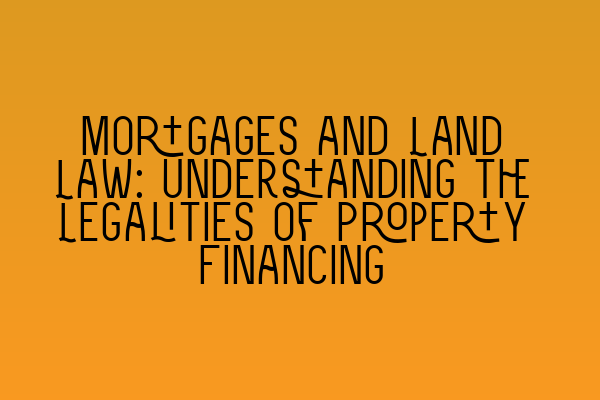Mortgages and Land Law: Understanding the Legalities of Property Financing
When it comes to purchasing property, one of the most common methods of financing is through a mortgage. A mortgage is a loan that allows individuals to buy a property and pay it off over time. However, there are several legalities involved in the process that both buyers and sellers should be aware of. In this blog post, we will explore the key aspects of mortgages and land law, shedding light on the intricacies of property financing.
Before diving into the legalities, let’s first understand the concept of a mortgage. A mortgage is a type of secured loan where the property being purchased serves as collateral. This means that if the borrower fails to make their repayments as agreed, the lender has the right to repossess the property and sell it to recover their money. It is important to note that until the mortgage is fully paid off, the lender retains a legal interest in the property.
Now, let’s delve into the legalities involved in obtaining a mortgage. One of the first steps in the process is conducting a search on the property to identify any potential issues or restrictions. This search aims to uncover any outstanding debts or encumbrances that may affect the property’s value or the buyer’s ability to secure a mortgage. These searches may include a bankruptcy search, a land charges search, and a local authority search, among others.
In addition to conducting searches, it is crucial to draft legal documents to formalize the mortgage agreement. These documents include the mortgage deed, which is a legal contract between the lender and the borrower, outlining the terms and conditions of the loan. The mortgage deed will typically specify the loan amount, interest rate, repayment period, and any additional fees or charges.
As a solicitor, it is important to ensure that the mortgage deed is executed correctly to protect the rights and interests of both parties. This involves ensuring that the deed is properly signed, witnessed, and registered with the relevant authorities. It is also essential to explain the terms of the mortgage to the borrower, ensuring they fully understand their obligations and responsibilities.
Furthermore, it is crucial to consider the impact of land law on mortgage transactions. Land law governs the ownership and transfer of property and includes various legal principles and regulations. For instance, if the property being mortgaged is leasehold, it is necessary to understand the implications of the lease agreement on the mortgage. Likewise, if the property is subject to any easements or covenants, these must be taken into account to avoid any potential legal challenges.
In recent years, there have been key changes in the UK property laws that affect mortgages and land transactions. These changes include regulations related to stamp duty, leasehold reforms, and the introduction of a new Help to Buy scheme. Staying up to date with these changes is vital for solicitors and buyers alike to ensure compliance with the law and to make informed decisions.
To navigate the complexities of mortgages and land law, it is advisable to seek legal advice from experts in property law. At SQE Property Law & Land Law, we offer comprehensive legal guidance to clients in all aspects of property financing. Our team of solicitors is well-versed in the intricacies of mortgages and land transactions, and we are committed to providing sound legal advice tailored to your specific needs.
In conclusion, understanding the legalities of property financing is essential for both buyers and sellers. Mortgages involve a range of legal processes, from conducting searches and drafting legal documents to considering the rules of land law. By seeking professional legal guidance and staying informed about relevant changes in property laws, individuals can ensure smooth and compliant mortgage transactions. For more information, check out our related articles:
– “Updates in UK Property Laws: Key Changes and Implications”
– “Legal challenges in property transactions: A comprehensive guide”
– “Navigating Lease Laws in the UK: Essential Guidelines for Tenants and Landlords”
– “Dominate Property Law Questions: Avoiding Common Pitfalls”
– “Land Law Revision Tips: Ace Your Exam Preparation”
At SQE Property Law & Land Law, we are dedicated to assisting clients with their property law needs. Contact us today to discuss your mortgage and land law requirements and let our team of experienced solicitors guide you through the legal complexities of property financing.
